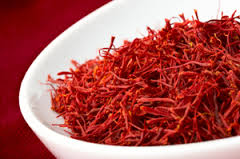About saffron
Saffron
Saffron is one of the highly prized spices known since antiquity for its color, flavor and medicinal
properties. It is the dried “stigma” or threads of the flower of the Crocus sativus plant. Its taste
makes it great for usage in food, as refreshment and even for making beverages. Saffron’s unique colour,
flavour and other properties give it culinary and medicinal characteristics that make it renowned all
over the world. It belongs to the Iradaceae family and is a native of the South Europe regions.A flower’s
stigma accepts the pollen that is produced by the stamen, which becomes the seeds of the next generation.
Each stigma is very small, and tens of thousands of individual strands go into a single ounce of the spice;
since the stigmas are hand-plucked from the individual flowers, saffron’s high cost becomes more
understandable.
Saffron has widespread traditional uses. It has demonstrated efficacy in mild to moderate depression;
however, a limited number of quality clinical trials exist. Potential exists for a role in the treatment
of cancer and age-related macular degeneration.A study conducted by Professor Silvia Bisti at ARC Centre
of Excellence in Vision Science and University of L’Aquila in Italy, found that saffron may slow or prevent
age-related vision loss and treat macular degeneration. Saffron is an anti-oxidant, but it appears to have
additional qualities that particularly affect vision.The compounds called crocetin which is present in saffron
improve memory and cognitive processing,These properties may be a useful for treating degenerative brain
disorders, such as Alzheimer’s disease, according to a study published in the “Journal of Clinical Pharmacy
and Therapeutics.
It helps in relieving inflammation of arthritis. Saffron also provides relief from joint pains. It is
very helpful for athletes as it eases fatigue and muscle inflammation by helping the tissues to get rid
of lactic acid which gets built up after strenuous exercise. Saffron also contains the compound “crocin”,
which scientists believe that helps in reducing fever. Crocin found in saffron also promotes learning,
memory retention, and recall capacity. Apart from this 50 mg of Saffron dissolved in a glass of 200ml
milk and a spoonful of sugar makes a very tasty drink, which is also a health tonic. A regular intake
of this every day for a period of time enables the body to build resistance against a lot of common
diseases such as Asthma, Common colds claim Ayurvedic Practitioners.

